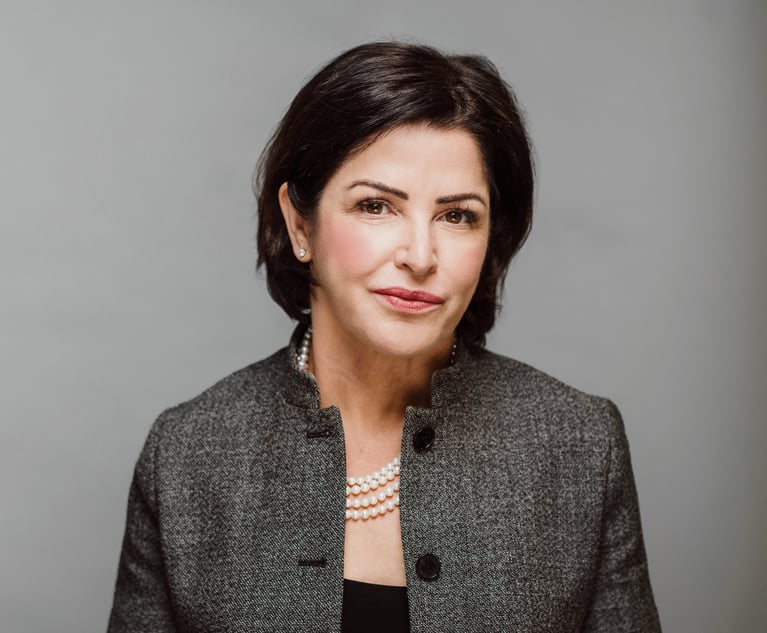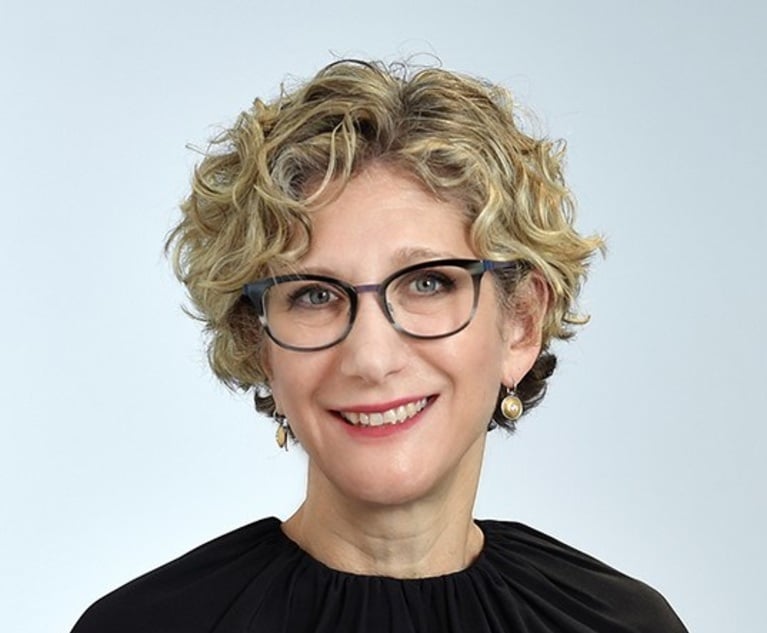Building a Talent Ecosystem: Delivering on the Lawyer Experience
Actionable tips for ensuring firms hire the right lawyers, train them appropriately and have the best crop to select for partnership.
July 09, 2019 at 05:00 PM
10 minute read
Law firms large and small are learning the importance of creating a smart and process-driven talent strategy. An important step in that process is laying the foundation of a talent ecosystem that is structured to deliver a lawyer experience that grows and evolves in tandem with each lawyer's career arc.
What do we mean by "lawyer experience"? Like any employee in a company or firm structure, lawyers embark on a journey that changes as they become more experienced and develop different goals. Their firm needs to manage this lifecycle: from the time they approach the law firm on campus, through recruiting and onboarding, and onto the time when they are being considered for promotion, the firm should be delivering on a carefully mapped-out experience with clearly designed processes for each stage of development.
Bring your brand to campus
On-campus recruiting should lead with a clear, articulated brand that incorporates both the client and lawyer experience. These aren't separate brands – what the firm stands for and the firm's value proposition to clients need to form a coherent story and identity. When a talent ecosystem is built around a clear identity, you'll attract the right people who can begin their careers well positioned for immediate and ongoing success.
It's OK if that identity is in part aspirational, but overall it needs to be an accurate expression of your firm's culture. With that at the centre, it's possible to adjust and adapt your brand to keep pace with what clients are looking for and what future generations of recruits require.
The recruiting and selection experience
You have to attract talent who want to do what your firm actually does. During the recruitment process, you have to be clear about your firm's practice, how your system works and what will be their journey once they get here. That's everything from training and staffing to team structure and exposure to partners.
One of the biggest challenges for law firms is being both realistic and honest about the story you tell. Today's law students are savvy about sniffing out promises that are too good to be true, and they are analysing your recruitment marketing campaign for what's true and what is overly sunny fiction.
Once you've attracted the right group to apply for associate positions, the selection process needs to be designed for today's legal marketplace.
Selection has become more complicated than when it was very focused on grades as the main predictor of future success. Firms are learning from the corporate world to look at factors like EQ, the recruit's character, and other kinds of intelligence that make the difference between A and B players.
Selection has to be more sophisticated, assessing for characteristics like determination, learning agility, passion and the ability to be a self-starter. These capabilities can lead someone to successfully navigate a big law firm, develop relationships, and intelligently persevere. Law firms are developing more sophisticated selection techniques, structuring the interview process to be a bit more scientific and help support goals like talent retention and maintaining a diverse, inclusive workforce.
When a firm starts to have data about their successful (and unsuccessful) talent, they can study that data to build success profiles instead of just relying on the interviewing partners to "know it when they see it".
Early career (years 1-2)
During the early years, building basic lawyering skills is critical – and it can be frustrating for new lawyers, because the work is not always the most exciting or intellectually challenging. Even when the work is monotonous or routine, it needs to be presented as part of a series of continuous learning opportunities – learning the skill of observation, including watching how others at different levels of seniority handle the work. Preparing mid-level and other senior lawyers to teach and work with early-career lawyers is critical.
Junior lawyers also need to learn to create a market for themselves – making themselves relevant, staffable and useful. They need not to shy away from owning their own development, which may mean at times asking for things that aren't being offered, or stepping up in some cases and going above and beyond what may be asked of them. Doing so can be challenging when learning how to navigate the culture in a law firm; early-career lawyers will benefit from extra direction on reading between the lines or understanding unspoken, nuanced rules.
A firm with a successful talent ecosystem will ensure that these new lawyers are getting all the right experiences in the first couple of years. And while those experiences may vary among practice groups or local offices, every person at the firm should be helping early career lawyers understand and appreciate the work the firm does. It will make them better lawyers and begin an experience of integrating into the firm.
Mid-career (years 3-5)
Next, the firm should be focused on providing really strong supervisors for mid-career lawyers. These are the critical years when they learn good (or bad!) habits, and there is nothing more powerful at this stage than having good role models in senior lawyers – especially if the partners have trained them to be role models. Being supervised by somebody who has had great supervision is a self-reinforcing process that should be part of a firm's DNA.
With strong supervision and a solid project management structure, mid-levels will learn how to lead teams and how to lead projects. This is also the time to begin providing business development experience, including chances to both build and actually deliver pitches.
Overall, in the mid-level years they need to be able to work far more independently and far more closely with partners – so exposure to partners has to ramp way, way up, allowing these lawyers to build relationships with partners who are going to take them under their wing. The mid-year associate should be able to name the two or three people who are really thinking about them, and with whom they feel a real connection.
This is made easier if lawyers have to 'declare their major' by this point. When they have a practice group to call home and good mentoring, it makes it easier to build specific skills and have a solid perch from which to develop a solid understanding of what the whole firm does.
One last point about the mid-years: although we don't like to think about it, this is the time to take a hard look at the lawyers who are not on track for a long-term position at the firm and help them transition to the next step in their careers. This is hard because the firm has already made a big investment over four or five years, and these lawyers have, in return, invested their time in the firm. Firms have to be open about their development and promotion processes. The sooner those who will be moving on can do so confidently, and the sooner you are able to narrow the field of lawyers who will move into the senior associate track, the more targeted the firm can be with resources for training and development.
Senior (years 6-8)
Senior associates should become responsible for the supervision, mentoring and leadership within teams, helping them to develop solid management and leadership skills.
They should have narrowed the landscape of partners they are working with and should feel very connected to not only a practice group, but even within that practice group a small number of specialised partners. And within this framework, a senior lawyer will feel that they are developing their own brand as a lawyer, and maybe have some niche skills that will lead partners to seek them out. Oftentimes they are now leading business development efforts, if not playing a leadership role on pitches and really seeing how new work is won. And they should be ready to redeploy the guidance they received, with juniors who look up to them for mentoring and skills training.
The firm's assessment of seniors needs to shift away from mostly evaluating technical skills to being really focused on their potential to play at the most senior levels of the firm. They're going to feel that they're being reviewed for partnership, but it's important for firms not to change how they treat their seniors during this time – I've heard unhappy stories that it's a very lonely time because people stop talking to them, they get very nervous about the possibility that they might not make it, and they wonder whether they are being discussed behind closed doors.
These lawyers are, frankly, at their peak value to the firm and are working incredibly hard, so the experience should be that they feel more valued than evaluated.
Promotion
Promotion is tricky and varies significantly from firm to firm. Because there are different kinds of partners – equity partners, non-equity partners, etc – a firm has to be very clear on its leadership philosophy and what is expected of a partner. If you can take a defined set of criteria into the promotion process, it will be easier for the firm and more clear to the associates to know what a good candidate for promotion looks like.
Because this is a multifaceted decision process, it's not going to look exactly the same from year to year. Where does the firm need to think about succession, whether that's replacement leadership or new leadership? Which practice groups need to have fewer partners or more partners? Are there new areas of the law that we need to grow, including crossover practices and international opportunities?
To correctly and effectively assess your talent needs, the firm has to be very clear on its succession requirements, its business plans and its leadership philosophy. Then it's easier to view candidates on multiple levels and get a clear picture of a successful promotion: current performance, potential for growth, business development potential, client management ability, etc. The firm should be able to look at every candidate and say, with a high degree of certainty, that this is the partner we want to have right now and 20 years from now.
Having this successful candidate in front of you goes right back to that well-articulated brand that kicked off the recruitment process. When the firm tells the right story about itself from the beginning, you're creating a lawyer experience with a long, coherent arc for people who are positioned to be developed, promoted and help build the brand to attract the next group of lawyers.
Hy Pomerance leads all aspects of Cleary Gottlieb's global legal and professional talent and human resources function, including diversity and inclusion, recruiting and professional development. Before joining the firm as chief talent officer in 2018, Hy held c-suite talent management positions at several Fortune 500 companies, including New York Life, UBS Financial Services, and QBE Insurance Ltd.
This content has been archived. It is available through our partners, LexisNexis® and Bloomberg Law.
To view this content, please continue to their sites.
Not a Lexis Subscriber?
Subscribe Now
Not a Bloomberg Law Subscriber?
Subscribe Now
NOT FOR REPRINT
© 2025 ALM Global, LLC, All Rights Reserved. Request academic re-use from www.copyright.com. All other uses, submit a request to [email protected]. For more information visit Asset & Logo Licensing.
You Might Like
View All
Pallas Partners Founder On the Disputes Trends to Look Out For in 2025
4 minute read
What to Expect From Teresa Ribera, the EU‘s New Competition Commissioner
6 minute read
Trending Stories
- 1Starbucks Hands New CLO Hefty Raise, Says He Fosters 'Environment of Courage and Joy'
- 2Blockchain’s Fourth and Fifth Amendment Privacy Paradoxes
- 3Prior Written Notice: Calabrese v. City of Albany
- 4Learning From Experience: The Best and Worst of Years Past
- 5Treasury GC Returns to Davis Polk to Co-Chair White-Collar Defense and Investigations Practice
Who Got The Work
J. Brugh Lower of Gibbons has entered an appearance for industrial equipment supplier Devco Corporation in a pending trademark infringement lawsuit. The suit, accusing the defendant of selling knock-off Graco products, was filed Dec. 18 in New Jersey District Court by Rivkin Radler on behalf of Graco Inc. and Graco Minnesota. The case, assigned to U.S. District Judge Zahid N. Quraishi, is 3:24-cv-11294, Graco Inc. et al v. Devco Corporation.
Who Got The Work
Rebecca Maller-Stein and Kent A. Yalowitz of Arnold & Porter Kaye Scholer have entered their appearances for Hanaco Venture Capital and its executives, Lior Prosor and David Frankel, in a pending securities lawsuit. The action, filed on Dec. 24 in New York Southern District Court by Zell, Aron & Co. on behalf of Goldeneye Advisors, accuses the defendants of negligently and fraudulently managing the plaintiff's $1 million investment. The case, assigned to U.S. District Judge Vernon S. Broderick, is 1:24-cv-09918, Goldeneye Advisors, LLC v. Hanaco Venture Capital, Ltd. et al.
Who Got The Work
Attorneys from A&O Shearman has stepped in as defense counsel for Toronto-Dominion Bank and other defendants in a pending securities class action. The suit, filed Dec. 11 in New York Southern District Court by Bleichmar Fonti & Auld, accuses the defendants of concealing the bank's 'pervasive' deficiencies in regards to its compliance with the Bank Secrecy Act and the quality of its anti-money laundering controls. The case, assigned to U.S. District Judge Arun Subramanian, is 1:24-cv-09445, Gonzalez v. The Toronto-Dominion Bank et al.
Who Got The Work
Crown Castle International, a Pennsylvania company providing shared communications infrastructure, has turned to Luke D. Wolf of Gordon Rees Scully Mansukhani to fend off a pending breach-of-contract lawsuit. The court action, filed Nov. 25 in Michigan Eastern District Court by Hooper Hathaway PC on behalf of The Town Residences LLC, accuses Crown Castle of failing to transfer approximately $30,000 in utility payments from T-Mobile in breach of a roof-top lease and assignment agreement. The case, assigned to U.S. District Judge Susan K. Declercq, is 2:24-cv-13131, The Town Residences LLC v. T-Mobile US, Inc. et al.
Who Got The Work
Wilfred P. Coronato and Daniel M. Schwartz of McCarter & English have stepped in as defense counsel to Electrolux Home Products Inc. in a pending product liability lawsuit. The court action, filed Nov. 26 in New York Eastern District Court by Poulos Lopiccolo PC and Nagel Rice LLP on behalf of David Stern, alleges that the defendant's refrigerators’ drawers and shelving repeatedly break and fall apart within months after purchase. The case, assigned to U.S. District Judge Joan M. Azrack, is 2:24-cv-08204, Stern v. Electrolux Home Products, Inc.
Featured Firms
Law Offices of Gary Martin Hays & Associates, P.C.
(470) 294-1674
Law Offices of Mark E. Salomone
(857) 444-6468
Smith & Hassler
(713) 739-1250










